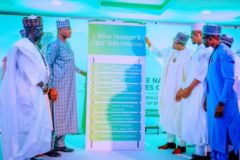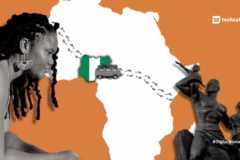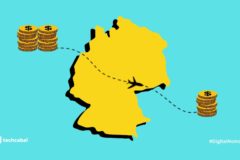Peace Itimi has spent 9 months away from Nigeria but doesn’t miss the country. She misses her cleaner and cook, though, because, in London, she doesn’t have a cleaner and cook. But she at least has peace of mind.
When Itimi started working remotely from Nigeria, she promised herself she would stay in Nigeria, until the Lekki toll gate killing—where tens of #EndSARS protesters, who were protesting against police brutality, were killed—scared her out of her wits. “I felt unsafe,” she recalled. It was then she started to reconsider her stance on immigration and realised money won’t shield her from how unsafe Nigeria was increasingly becoming.
A friend gave her the nudge to leave the country, recommending that she go through the Tech Nation Visa—a visa that allows tech talent across the world to live and work in the UK—because, he felt, she was a good fit. In 2021, she started researching the programme, and even though she felt the requirements were scary, she realised that everything she had done up until that point made her a perfect fit.
Finding different loves
Itimi grew up in Benin City, Edo state, and studied medical biochemistry at Delta State University. She fell in love with digital marketing while in university. She said university had been one of the most definitive phases of her life because it was where she found God, found herself, and digital marketing.
When she became a Google Student Ambassador, she started training other students in digital marketing in school. Fresh from school, she launched a digital marketing agency with a friend in 2016.
She moved to Lagos in February 2017 to begin her national service year at digital marketing agency, Webcoupers, and that was where she officially launched her career. In 2018, she joined Wild Fusion, another digital marketing agency, where she trained people on digital marketing, branding, Google Ads, and SEO. She, in that same year, also organised training on behalf of Facebook, Orange Academy, and the British Council.
During one of her travels for digital marketing training in Accra, she realised that even though she loved travelling, her physical reach was limited. “I can’t train people in Accra except when I travel to Accra. So, I started thinking that a way to break that divide was to start training people online and that means I can reach anybody anywhere, so long as they can find my content.”
So, Itimi started a YouTube channel in December 2018 where she initially shared marketing tips and random lessons about life, before launching a now-popular segment called Founders Connect, where she has interviewed about 40 African founders, including Odun Eweniyi of Piggyvest, Atsu Davoh of Bitsika, and Ezra Olubi of Paystack.
In 2019, she entered the Nigerian tech ecosystem after landing a role as the Head of Marketing at fintech company, Korapay, before moving to Venture Capital (VC) firm, Seedstars in 2020.
First comes loneliness
In the first few months after Itimi arrived in the UK last June, she felt lonely. She had never been so far away from home before; the farthest she had travelled had been within the continent, to Cape Verde, in 2019.
Everything was new to her in the UK. For example, the summer was warm yet she still felt cold. She couldn’t see clearly and had migraines when she went outside without sunshades. It also took her a while to adjust to the predominant use of contactless payment in London.
As an introvert, making friends was initially difficult for her, even though she didn’t face this difficulty back home. In Lagos, she was mildly popular so people started conversations with her at events. Now in the UK, she decided to become more intentional about making friends and connecting with people by starting conversations. When she sees someone on social media she wants to connect with, she reaches out and asks them to have a coffee or jump on an informal call with her. “I am learning that a new environment and country requires an improved me. I have to do extra work,” she said. “And what this means for her is that she has to move past her introverted nature and social anxiety because to live the life she wants she must connect with people, build a network, and make impact in this ecosystem.”
In the months that followed, she made more friends when she joined a cycling community of about 20 other immigrants and her friends for whom she had reviewed the Tech Nation Visa applications joined her in the UK. On top of that, on the back of her YouTube video where she shared her experience with the visa application, at least 20 people have reached out to tell her they had got the visa.
London, the good and the bad
She currently works remotely as Head of Growth for offline fintech app, Stax and admits that her productivity has increased since she moved. “I don’t apologise for bad internet anymore. I don’t have to worry about electricity, either. I can afford to leave my laptop unplugged.”
Itimi is excited about the travelling opportunities London presents; she feels more confident applying for visas for different countries now than she ever was in Nigeria. London has the most connected flights anywhere in the world and they are relatively cheaper.
“When I travelled to Kenya from London, in February, my flight cost less than a flight from Lagos to Kenya.”
One thing Itimi likes about London is its diversity—in people, food, and even the hobbies she can choose from. She is also in love with its efficient transport infrastructure: “It doesn’t exceed the time I estimate to get to my destination.”
“I know this exposure to working infrastructure and this level of diversity is doing something to my mind that I will be grateful for in a couple of years because of how I would have grown as a person.”
She also loves the feeling of freedom in the city, which allows people to be themselves. “For instance, I feel like my confidence in the way I dress has increased a lot since I moved to London, compared to when I was in Nigeria.”
But she doesn’t like the weather. During the winter, she rarely left her house, and when she did, her multiple layers of clothing didn’t stop the cold from getting to her and the wind from threatening to blow her over. She looks forward to the summer, which she prefers.
Maybe higher up on the list of things she doesn’t like are taxes, because there are a lot of them. “I feel like if I thought too much about my taxes I probably would not have moved when I did; I would have waited a bit longer to save more money in Nigeria.”
Digital Nomads is a weekly column on TechCabal where we explore the everyday lives of Africans who leave their home countries to study or work elsewhere, and Africans who leave their conventional jobs for new professions in tech. A new episode drops every Wednesday. If you think your story fits the Digital Nomads bill, reach out to us here.






















